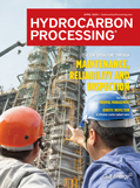Utilities
Business Trends: A perspective on new technology impacts on the chemical processing industry
Over the past five years, the industrial evolution has been propelled by the same technologies that have dramatically changed our private lives.
Optimize the selection of sulfur unit blocks and process technology combinations
Since the 1940s, the present form of the Claus sulfur recovery unit (SRU) has been successfully applied in the refining and gas processing industries.
Editorial Comment: Optimizing operations by advancing process controls, instrumentation and automation technologies
When driving by or visiting a refinery or petrochemical plant, one cannot help but gaze at the expansive sea of metal towers.
Fired heaters in the process industries: Optimizing operations and minimizing emissions
The process industries, which include chemicals, metals and mining, oil and gas, petrochemicals, pulp and paper, and refining, are very energy intensive
Unconventional improvement of propylene recovery yield at the PP splitter
Thermocompression-equipped propane-propylene (PP) splitters are used to upgrade large quantities of refinery-grade propylene (RGP) to polymer-grade propylene (PGP).
Extracting business value from digitalization in oil and gas
Most oil and gas companies are investing in digitalization; however, they often fail to move beyond proof of value (PoV) or pilot projects.
Business Trends: Autonomous operations in process manufacturing—Part 2
The purpose of this article is to demonstrate an autonomous operations (AO) vision, along with its feasibility, by conceptualizing a roadmap where meaningful progress can be achieved in a horizon of 3 yr–20 yr.
Hydrocarbon Processing 2020 Awards WINNERS
<i>Hydrocarbon Processing</i>, the downstream processing sector’s leading technical publication, has announced the winners for its third annual awards.
Business Trends
Rovuma LNG, a JV comprised of ExxonMobil, Eni and China National Petroleum Corp., will likely delay its final investment decision (FID) on the group’s $30-B Mozambique LNG project.
Variable capacity control technology facilitates efficient operation for reciprocating compressors
Reciprocating compressors are used extensively in refinery and petrochemical operations to keep feedstocks and products moving through miles of piping.

- Equinor selects Aker for Mongstad refinery upgrade project 5/1
- Australian researchers testing SAF production from landfill gases 5/1
- ACC responds to U.S. EPA's final risk management rule for methylene chloride 5/1
- Topsoe awarded contract to support FEED study for new low-carbon ammonia plant in Louisiana (U.S.) 5/1
- ClearSign Technologies receives burner contract for California (U.S.) refinery 5/1
- Traders scramble for U.S. storage as distillates demand disappoints 5/1




